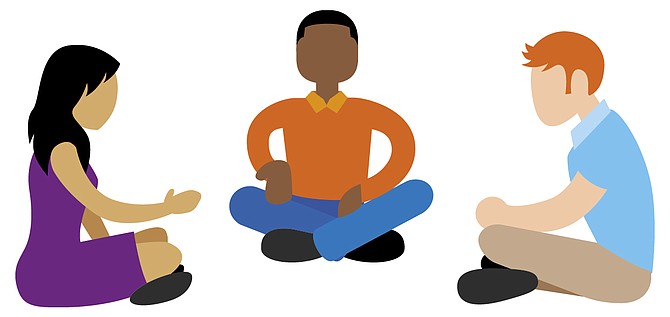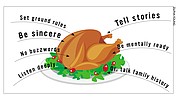You can't sugarcoat it. In the wake of the 2016 presidential campaign, these are tough, divisive times. We're all hearing a lot about how Americans don't talk to people who disagree with them, especially between races and economic classes. We don't know each other. We're even worried about facing family members with different views during the holidays. You know, Thanksgiving went so well.
Social media, of course, doesn't always help, and often hurts. We have very select networks of "friends"—many of whom we never see or even meet—and we can easily edit out, mute or block disparate points of view. It is an avenue for anonymous attacks and others 'splaining our own views to us, leaving many people frustrated and defensive about the "trolls" in our midst, and not wanting to engage across the gulfs. Then there are all those bots pretending to be people, many of them from outside the nation, and all of them sowing dissension.
But the answer can't be just staying separate from those who disagree with us, and never trying to bridge the gap. That's how we became a red-blue, binary, divided nation in the first place. We need to seek the purple for the sake of our nation and democracy. As President Obama said in his Dec. 16 press conference, division "is the thing that makes us vulnerable."
Looking at imminent family gatherings during this season of love and giving, how do we cope? If we want to begin to heal these divides, it won't be easy, but we will all need to engage to keep this division from widening and weakening our communities and nation.
This GOOD Ideas issue offers ideas on how to do that in productive and loving, if sometimes intense and uncomfortable, ways without cussing out your weird uncle across the holiday dinner table. Let's do this.
First, the Family:
You Love Them, But ...
Let's start with how to have a civil conversation with the people you care about the most, but who might have voted for a candidate you find despicable. Maybe you have no desire to talk to them about politics, but they always seem to bait you into it, or so it seems.
How to manage?
If you prefer to avoid having a political argument with someone you believe doesn't debate fairly, or who just wants to argue for argument's sake, then you will need to be proactive and direct. You can borrow a trick from more organized, structured dialogue strategies and set some ground rules in advance.
Think of your cousin who comes to the holiday table wearing a Trump or Clinton shirt, as one of our staffers had happen at Thanksgiving. You think he's salivating to have a knock-down-drag-out argument—so go ahead and speak up, sternly but with love. Say something like, "We all know it's been a tough political season, and we're on different sides of the political table. Let's agree not to talk politics today, and just enjoy each other's company."
Chances are, others will readily agree, even if not the one cousin.
In our staffer's case, his grandmother did just that, basically declaring that politics were off-limits at her dinner table before it had a chance to take a sour turn. And all was peaceful.
... You Want to Have Real Dialogue
Now, you may want to have a deep, productive conversation with family members to help mend the nation's divides, and I encourage it because we've got to start somewhere. Why not here?
Vox.com offered five tips that I appreciate. Here they are with my thoughts added under each.
1. Tell a story rather than argue or debate issues or statistics.
The truth is, stories—not lectures—persuade and build empathy. Talk about your own experiences and those of people you know. Make it human.
Think about the Bible and the movies and books that taught you a lesson. They do it with story, not data. It's why I tell my writers never to begin a story with statistics or a dry recitation of "process"—you lose readers right there. Instead, tell them a story they can relate to and feel the joy and pain. Think of all those pictures of Syrian children that say a lot more than dry numbers and facts.
2. Be as sincere as possible.
This is especially important with family, as our education and daily experiences can be very different than when we hang out with our chosen friends. Don't go home and act superior—I know I've been guilty of that—instead of being real and serious in your conversations. You can speak your mind, but do it with kindness, humility and, as Vox recommends, a lot of compassion.
3. Listen deeply rather than assuming.
These days it's easy to call someone a racist or a misogynist rather than trying to relate to them why you believe what they said is offensive (which not everyone will like, either). But if you listen carefully to what they're saying, or ask them why they voted for Trump, for instance, you might learn that they are deeply and spiritually opposed to abortion rights, and that is what drove their vote. So start there.
Even if you believe in the right to a legal abortion, that doesn't mean we should disregard others views out of hand. It's possible to have a conversation about abortion that acknowledges the deeply held views on both sides, while talking about ways to find common ground—such as things you can both do to keep abortion rare.
4. Do not rely on shorthand and buzzwords, like "privilege" (even if you believe they apply).
I understand my privilege as a white person even if I grew up relatively poor in a sexist society. But I won't convince others of it by just telling them to "check your privilege." Same with use of "racist" or even "hetero-normative." Sure, discuss those issues, but don't use those words as a way to name-call (or sound smarter) because it won't work even if you get a momentary high from it. Yes, it may be useful to explain the difference between racism (systemic oppression by the majority) and bigotry (garden-variety prejudice that can flow any direction), but that needs to be done in a smart way, infused with story—and maybe later in the dialogue after you've found some common ground.
5. Be in "the right mental place."
These are not easy conversations, and you might not be ready to have them. You can decide to wait, which might mean declaring those rules I mentioned above, saying "I'm not ready to discuss this now" or deciding to ignore attempts to bait you into it. If you're not ready to try, it can turn in raw anger and explosions that grandma sure won't appreciate.
TIP: You can always pivot to family history.
In the past, my partner and I have ended up in stressful political conversations, with me even walking out one time. By the next visit, I had gotten deep into family history, and started talking about it at the beginning, even pulling up Ancestry.com to look up new stuff as everyone joined in. It's a perfect diversion that brings family together about what they have in common. And it often offers surprises that can help widen the family circle. Try it.
P.S. If you have elderly relatives, record them telling family stories. You'll regret not doing it later, and it's a perfect conversation builder now.
Then, the Community:
Courageous Conversations
In this time of intense division and distrust, dialogue is a must. If you pay attention, you'll hear about a variety of ways to take part in group or community conversations, especially about race, and I highly recommend them. You can take part in a free Jackson 2000 dialogue circle right here in Jackson, or watch for upcoming opportunities developed by W.K. Kellogg's "Truth, Racial Healing and Transformation" team, of which I'm now a part. The William Winter Institute for Racial Reconciliation in Oxford presents Welcome Table conversations around the state.
"The Welcome Table creates a safe space for diverse community stakeholders to form healthy relationships via open, honest communication," its website says.
The Southern Poverty Law Center's wonderful "Teaching Tolerance" project gives advice for "courageous conversations" on its website: "Sustained dialogue is a process used to transform relationships for the purpose of fostering meaningful change in any community." And during my W.K. Kellogg Foundation fellowship, we routinely gathered in "wisdom circles" for a similar purpose.
These kinds of conversations are soul-affirming, and sometimes difficult, and they require a bit of courage.
But on the other side of the discomfort lies a connection to others you will never have if you don't both share your experiences and listen. People continually discover common ground through these dialogues, as well as learn about challenges other people have that we don't. They build empathy through story and honesty. And it helps people of all races face their own implicit biases about the other. Find yourself a good one, show up, be real, listen and be transformed, and make new friends.
Caution: Safety Vital
One thing every successful dialogue model I know of offers is a "safe space." That is, the conversations happen with ground rules in place, usually not allowing interruptions or voiced judgment, guaranteeing confidentiality and with trained facilitators who can talk to you afterward to help you process what just happened.
This perceived safety is especially vital to inviting people into the space who might not feel welcome, such as white men who might feel like they're blamed for everything but who want to participate or people of color who might be told what to think.
People need space to listen, talk and grow without being immediately pounded on—especially if they are willing to be there and share in the first place. It's about sharing, not lecturing.
That said, "safe" can't mean you won't be challenged in your own thinking by hearing what others feel. That is the point.
What I've Learned
It's tough to walk into a conversation, whether a brief one or a deliberate series of deep dialogues, and know that you may get beat up for what you say. Although new at this, I've been through a good number of "wisdom circles" and powerful back-and-forth dialogues through my fellowship with the W.K. Kellogg Foundation, and I've learned a few tips that work for me.
1. Remember that it's not all about you. It's easy to become self-focused and defensive and look for slights in what someone else has to say. Take a breath and think before you judge, lash out or belittle someone for getting it wrong to your thinking.
2. Have compassion for everyone in the conversation or circle. All of us don't know what we don't know, and we have conversations to figure it out. Cut each other some slack.
3. If you're the type to speak up quickly, take a breath and just listen for a while. This is especially true if you're a member of a "dominant culture"—basically, the white folks who tend to control a lot of conversations. If you don't usually speak up, look for the inner courage to participate. Your story is important to us all, too.
4. Remind yourself that your experience is not always the "right," or only, one. Don't be judge-y or an eye-roller.
5. Actively listen. As others talk, do you (a) listen to refute something they're saying or (b) think about the next thing you're going to say the whole time? If you focus fully on others' words, your response will be authentic when you make it—and help calm your nerves.
6. Don't jump in to fill a silent space. Be OK with the quiet so you and others can think and process what you're hearing.
7. When you talk, try to distinctively end your sentences with brief breaks so others have an opportunity to enter the conversation, unless you're in a dialogue that does not allow back and forth, of course.
8. It's OK to speak up if you think others are shutting down productive dialogue or not being respectful. It's also OK to just stay quiet and choose not to talk, and just listen if that is most important for you.
9. Say "I'm sorry" when you interrupt, and try hard not to interrupt.
10. Listen for the points of commonality to expand on rather than the contention to argue over.
11. And be fully, fully present.
Safest Space: Affinity+Identity
During and after the election season, we've heard a lot about "identity politics," often derisively. You know, when someone votes a certain way because they're white, black, Latino, female, LGBT, etc.? Identity politics are a bad thing, we're told. And they are, in many ways, especially if done in a divisive way.
The truth is, though, "identity politics" came about in the first place, at least for non-white-supremacist groups, because some dominant group marginalized those members. Think about it: How much would you hear about LGBT groups banding together if they weren't discriminated against? Or women's rights groups? Or, even the Black Lives Matter movement?
It can be difficult to have cross-conversations between groups on different sides of identity politics. That is one reason "affinity groups" have sprung up on college campuses and beyond: to give voice to members of a group with "affinity" with each other, such as gender, race or even a common history.
When done well, affinity groups are not clubs; you must be a member of the group to participate. And the goals are positive: to identify ways to make positive strides. That is very different than coming together to strategize to hurt other groups.
Tolerance.org talks about a Muslim student group at a school in Maclean, Va., that discussed the problem with needing to miss class to attend religious services, even as those of other faiths had days off. The math teacher who facilitated helped them get Muslim holy days added to the school calendar.
Such groups help members find like-minded people and solutions that actually help them more easily live in the larger, more diverse community.
But, Whites-only?! Really?
Yes, this can be a good idea, believe it or not. We're not talking about a defensive or supremacist group, of course. White affinity groups are a way for members to come together to explore race and racism, and maybe even the role their own families might have played in discrimination.
It is also a way to get around the common problem of white people being too uncomfortable or ashamed to talk about these issues initially in a diverse group. And it can help those hampered by what is sometimes called "white fragility" get past the defensiveness of the country's history of racism—basically to get past feeling as if their own skin color effectively makes them guilty in others' eyes.
White affinity groups aren't a way to let white folks off the hook, though. They are used as vital tools to help reluctant people find a way to have these conversations and see a way forward. Like anything else, talking about race gets easier with practice.
These groups can result in strong shared efforts to fight society's racism, and to bridge divides. Allies are often born in white affinity groups.
The Magical Life of Being an Ally
OK, this one is personal. I often see fellow white people so defensive at any mention of racism or the need to end it—such as the dramatically overblown reactions to people willing to say out loud that "Black Lives Matter" in the wake of numerous shootings of unarmed black people in America because it means white lives don't—which is absurd. We've all heard, or maybe said, the following many times. Mark each true or false.
- That was all a long time ago. ____
- It's all those crazy people in the KKK, not people I know and love. ____
- I don't need to feel guilty about what I didn't do. ____
- Black people need to get over it and move on. ____
- All lives matter! _____
(Answers: 1, 2 and 4 are false, while 3 and 5 are true and undisputed.)
Here's the nut that is cracked from inside if you're willing to try: It is a wonderful life to be an ally to people who are historically, or currently, oppressed in some way. As an ally who "does the work," as it's called when you get informed and engaged, you meet a wide array of caring people who don't actually blame you for their plight, as long as you show up with an open heart and don't blame the historically oppressed for oppression.
The love back and forth flows openly, and you learn fascinating history, much of it shared when we're honest about it. Yes, there are exceptions: You'll meet the occasional person who hates you for your skin color, but a white ally knows it can never be as bad for me as for people who are followed by clerks when they go shopping or profiled by police.
My point? It's wonderful to be an ally, to listen, to love and sometimes to fight for an ever-widening array of friends, and to learn history that we all share, filed with heroes as well as villains. I believe that understanding what awaits on the other side of divides is the Holy Grail more people should seek and find. We just must be willing to go there.
TIP: Always Ask Why
If you really want to understand other people's realities—such as why crime is worse in their community—take it back up the line. That is, explore and ask people why they believe the problems exist, and be willing to listen. And don't be defensive: Remember that you probably didn't do those things 50 years ago, but the systems of segregation set up cycles of poverty and crime. Knowing that makes you smarter and makes it easier to help find solutions.
What We Share
Former Gov. William Winter is a national leader on race dialogue. He likes to say that all Americans discover they have basic desires in common when they take time to talk and listen. They include:
• Good schools for their kids
• Access to quality health care
• Safe neighborhoods
• Economic security
DEFINED: What is 'white fragility'?
"A state in which even a minimum amount of racial stress becomes intolerable, triggering a range of defensive moves. These moves include the outward display of emotions such as anger, fear, and guilt, and behaviors such as argumentation, silence, and leaving the stress-inducing situation."
—Robin DiAngelo
Read the full "white fragility" report.
"As an affinity group, White Students Confronting Racism provides a space for white people to develop our racial identity while simultaneously becoming effective anti-racist allies to people of color."
Ali Michael and Mary C. Conger, White Students Confronting Racism
More like this story
More stories by this author
- EDITOR'S NOTE: 19 Years of Love, Hope, Miss S, Dr. S and Never, Ever Giving Up
- EDITOR'S NOTE: Systemic Racism Created Jackson’s Violence; More Policing Cannot Stop It
- Rest in Peace, Ronni Mott: Your Journalism Saved Lives. This I Know.
- EDITOR'S NOTE: Rest Well, Gov. Winter. We Will Keep Your Fire Burning.
- EDITOR'S NOTE: Truth and Journalism on the Front Lines of COVID-19









Comments
Use the comment form below to begin a discussion about this content.